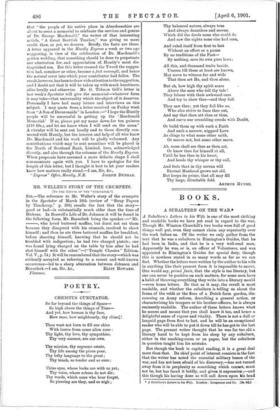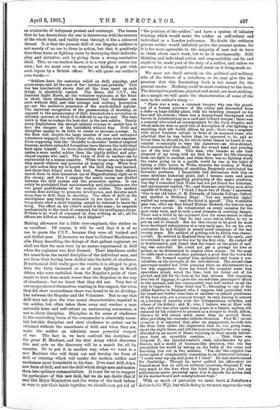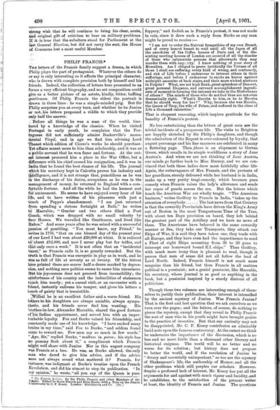BOOKS.
A SUBALTERN ON THE WAR.*
A Subaltern's Letters to his Wife is one of the most striking and readable books we have yet read in regard to the war. Though Mr. Winston Churchill's two books were full of good things well put, even they cannot claim any superiority over the work before US. Of the writer we only gather from the text that he was a subaltern in Rimington's Guides, that he had been in India, and that he is a very well-read man. Apparently he was, or is, an officer of Volunteers, and was appointed to Rimington's Guides for special duty, though this is nowhere stated in so many words as far as we can find. Whether the letters were written by the author to his wife in anything like their present form it is impossible to assert. One would say, prima' fade, that the style is too literary, but one can never be positive on such matters, for some men have a habit of throwing everything they write into a literary mould —even home letters. Be that as it may, the result is most readable, and whether the subaltern is telling us about the fauna of the veldt or the flora of a Dutch farm garden, dis- coursing on Army reform, describing a general action, or characterising his troopers or his brother-officers, he is always eminently readable. The author of these letters knows what he means and means that you shall know it too, and hence a delightful sense of vigour and vitality. There is not a dull or languid page from first to last, and he will be an exceptional reader who will be able to put it down till he has got to the last page. The present writer thought that he was far too old a literary hand to be kept from his sleep by any subaltern, either in the smoking-room or on paper, but the subaltern in question taught him his mistake.
But though the book is capital reading, it is a great deal more than that. Its chief point of interest consists in the fact that the writer has noted the essential military lesson of the war, and has not been afraid of his discovery,—has not turned away from it in perplexity as something which cattnot, must not be, but has faced it boldly, and given it expression ;—and this though his having done so will call down upon his head
• A Sutvitern's Letters to his Wife. London: Long-mans and Co. C.
an avalanche of indignant protest and contempt. The lesson that he has drawn from the wax is interwoven with the texture of the whole book, and visibly runs through it like a coloured thread. It is that the present drill of our Regular soldiers is not merely of no use to them in action, but that it positively does them harm as fighting units by destroying their individu- ality and initiative, and by giving them a wrong combative ideal. This, as our readers know, is to a very great extent our
view ; but we must own to surprise at finding it put with such vigour by a British officer. We will quote our author's
own words :—
" Soldiers have for centuries relied on drill, pipeclay, and goose-steps, and all the rest of the leather and prunella.' This war has conclusively shown that all the time spent on such things is absolutely wasted. The Boers, the C.I.V., the Imperial Light Horse, all the volunteer regiments at the front in short, have abundantly demonstrated that discipline can exist without drill, and that courage and military perception are not the exclusive possession of the much-drilled regular. The universal recognition of the paramountcy of shooting, as opposed to the paramountcy of drill, foreshadows a revolution in military systems of which it is difficult to see the end. The bare truth is that nowadays the best shot is the best soldier. Nearly every Englishman has enough natural courage to enable him to face the dangers of the battlefield without fear. Drill and discipline appear to do little to create or increase courage. In the Boer war, despite the large number of raw and untrained volunteers engaged, the only troops who ran away were regulars. Even supposing that the shoulder to shoulder' method inspired bravery, modern extended formations have thrown the individual back upon himself. In short, the civilian who can shoot straight makes a more useful soldier than the highly drilled and pipe- cloyed regular who can't. The value of drill in warfare can be represented by a minus quantity. When troops are on the march they march without any pretence at keeping step. When they go into action they try to forget all the drill they ever learned, and those that forget most fare best. Sometimes their officers march them in close formation (as at Magersfontein) right on to the enemy, and then I suppose the men's curses are divided between the drill system and the promotion system. It can safely be postulated that marksmanship and intelligence are the two great qualifications of the modern soldier. The modern system does nothing to promote intelligence, and devotes much more time to drill than to shooting. The effect of drill on the intelligence may fairly be estimated by the force of habit. A troop-horse after a short training cannot be induced to leave the troop. The effect on his rider's mind is the same ; he responds mechanically to the word of command, but his intelligence Bleeps. If there is no word of command he does nothing at all ; all his officers are killed er wounded ; he is helpless."
Making allowance for a little over-emphasis, this strikes us as excellent. Of course, it will be said that it is of no use to quote the C.I.V., because they were all trained and and drilled men. If, however, we turn to Colonel Mackinnon's able Diary describing the doings of that gallant regiment, we shall see that the men were by no means experienced in drill when the regiment was first formed. Their steadiness under fire came from the moral discipline of the individual man, and not from their having been drilled into the habit of steadiness.
If mechanical drill really gave the results it is alleged to give, then the forty thousand or so of men fighting in South Africa who were undrilled, from the Regular's point of view, ought to have done much worse than the Regulars in the way of steadiness ; but we know that they did not. Very few of our troops showed themselves wanting in this respect, but when they did show unsteadiness there was found to be no dividing- line between the Regular and the Volunteer. But to say that drill does not give the true moral characteristics required in the soldier, but often takes them away and renders a man naturally keen and self-reliant an unreasoning automaton, is not to decry discipline. Discipline in the sense of obedience to the controlling brain of the commander is absolutely essen-
tial, but this discipline and alert obedience to orders can be obtained without the anesthesia of drill, and when they are, make the soldier an infinitely more powerful weapon of war. The fact is, we have outlived the doctrines of the great M. Martinet, and the first Army which discovers this and acts on the discovery will be a match for all its enemies. Or to put it in another way, what we want is a new Martinet who will think out and develop the form of drill or training which will render the modern soldier and marksman most formidable to his foes. If we want drill, it is a new form of drill, and not the drill which drugs men and makes them into military somnambulists. It is not for us to suggest the particulars of this new drill, but we do not doubt that if men like Major Itimington and the writer of the book before us were to put their heads together, we should soon get rid of " the position of the soldier," and have a system of infantry training which would make the soldier as self-reliant and individual as a London policeman. No doubt the ordinary private soldier would infinitely prefer the present system, for it is far more agreeable to the majority of men not to have to think about one's work, but to do it mechanically. Still, thinking and individual action and responsibility can be, and ought to be, made part of the duty of a soldier, and unless we are too lazy or too stupid we shall insist on it being made so.
We must not dwell entirely on the political and military side of the letters of a subaltern, or we may give the im- pression that this fascinating book is not meant for the general reader. Nothing could be more contrary to the facts. The descriptive portions, physical and moral, are most striking. As a sample we will quote the characteristics of some of the men in the author's troop :—
" rhere was a man, a common trooper, who was the grand- son of a former governor of the colony and descended from a duke—a huge kindly giant, with his breeding stamped on his face and his actions ; there was a demon-faced blackguard well. known in Johannesburg as a card and billiard sharper ; there was a corporal who acted as correspondent for the Daily Graphic, and whose articles were as good bits of description of real fighting as anything that left South Africa by post ; there was a sergeant with about fourteen initials in front of an assumed name, who admitted that he was better than he appeared to be, and no better than he should be, for which latter reason he found it con- venient occasionally to vary his signature—an olive-skinned, black-moustached dare-devil, with the round head and piercing eye of the true Celt. This man, who became at one time sergeant of my troop, told me that he spent his life hurrying from one fight to another, and when there was no fighting worth the name going on in a pacific world he was in the habit of taking a little house in Wales, wherein the reading of Welsh history and the drinking of sparkling Burgundy constituted his favourite pastimes. I frequently had discussions with him on some abstruse historical point, and I became more and more astonished at the appalling profundity of the man's erudition. One day I remarked that Wales had not yet found her historian, and my sergeant replied, 'No ; and there are only three men alive capable of writing it.' 'I think I know two of them,' I answered. One is my old tutor, 0. M. Edwards, of Lincoln College, Oxford, and another is Professor Rhys." You are perfectly right,' replied my sergeant ; 'and the third is myself.' This wonderful man was, after my dear friend Hubert Howard, the bravest man I ever came across. He volunteered on every occasion for the most risky work, and he took a real pleasure in courting danger. There was a belief in the regiment that for some reason or other he was unhappy, and that he had come out to Africa to try to put an end to himself. But for this theory to be good he must have developed unhappiness at a very early age ; for on his own confession he had fought in nearly every campaign of the last twenty years. His method of getting out to Africa was charac- teristic. He arrived in England from the ends of the earth, and determined to go out to the war by the first ship. He rushed off to Southampton, and found that the vessel on the point of sail- ing was cram-full. He could not get a passage for love or money, so he determined to employ other means. On the quay he came upon a second-class passenger a good deal the worse for liquor. He bumped against him, apologised, and began a con- versation on the strength of the introduction. The second-class passenger needed but little pressing when an adjournment to a bar was suggested ; there my friend the sergeant made him speechless drunk, noted the time, took hie ticket out of his pocket, and left for the boat at the last minute. Not requiring two lots of luggage, he gave the second-class passenger's effects to the steward, and was consequently very well waited on all the way to Capetown. Then there was V., belonging to one of the oldest families in England, who, I suppose, had quarrelled with his bread-and-butter some time or another—a refined gentleman of the best sort, yet a common trooper in ours, having to consort on a footing of equality with the Johannesburg swindler, and others of his kidney ; and M., who, I believe, was at Eton with me, and who has since spent some years in a lunatic asylum, till released by his relatives to proceed as a trooper to South Africa, whence he will return much saner than he arrived there, after providing his comrades infinite diversion. Poor M.! on one occasion it is reported that, after an engagement, he rode into the Boer lines under the impression that he was going home, spent the night there, and left the next morning for his own camp, attended by an escort of Boers rejoicing at their speedy deliver- ance from an unearthly creature Then there was Corporal F., the Quartermaster's clerk, schoolmaster by pro- fession, and a model of business-like precision, who one day astonished the world by taking on the bully of the corps and knocking him out in two minutes. Yes, sir,' the corporal was never tired of complacently remarking to an interested listener ; I could wear my cap and gown if I liked.' He had matriculated for Cambridge. Though he never quitted his office-stool (or tinned-meat box on end) on ordinary occasions, Corporal F. was
very much to the fore when the band began to play; but my
solicitations never prevailed upon him to parade for action clad in his mortar-board and undergraduate toga."
With so much of quotation we must leave A Subaltern s Letters to his Wife, but while doing so we must express the very ektRong wish that he will continue to bring his clear, acute; awd original gift of criticism to bear on military problems. 1,4 it-is true that the subaltern stood for Parliament at the 1st General Election, but did not carry the seat, the House 4:Commons lost a most useful Member.








































 Previous page
Previous page